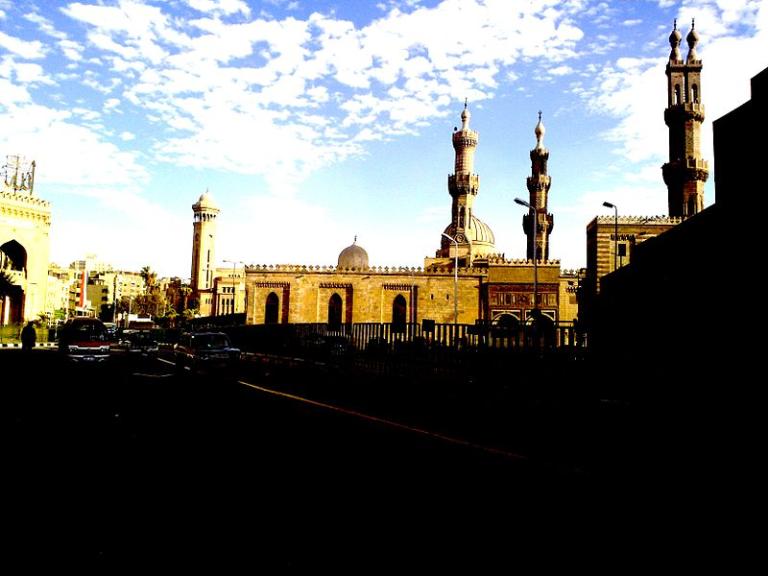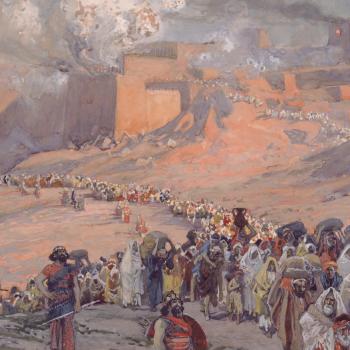
(Wikimedia Commons)
I’ve lately received several inquiries about Islam’s shari‘a (or, as it’s often somewhat misleadingly termed, “shari‘a law’). With that in mind, I think it not inappropriate to share this column that Bill Hamblin and I wrote and that appeared in the Deseret News on 1 December 2012. It’s dated in parts, but, overall, it contains some still-useful information and, perhaps, a helpful insight or two:
The ongoing constitutional crisis in Egypt — provoked by President Mohammed Morsi’s attempt to seize near-dictatorial powers for himself — has again brought the concept of Islamic law, or Shariah, to the forefront of Western consciousness.
Morsi’s Freedom and Justice Party seeks to limit the authority of Egyptian judges in part to facilitate the restoration of Shariah, the much misunderstood and maligned Muslim legal system, as the country’s law.
Religion has always constituted a foundational element for the creation of law in traditional cultures. Such societies generally view laws as more than merely custom, the arbitrary will of the ruler or the continually shifting opinions of the people.
Viewed in context along with the “dharma” of Hindu and Buddhist cultures, Jewish rabbinic law (Halacha), and medieval Christian law, which attempt to work out the details and implications of God’s revelation as contained in holy scripture, Shariah is scarcely unusual. It’s simply the manifestation in Islamic culture of a universal goal of premodern societies: making their legal order reflect the will of God.
For Jews, the source of Halacha is the Torah (“Law”) found in the Bible — especially the five books of Moses — as expounded in the “oral Torah” by Moses and interpreted by subsequent rabbis. Likewise, for Muslims the source of Shariah is the Quran — the ultimate revelation of God to Muhammad the prophet — as expounded and exemplified by Muhammad and interpreted by later legal scholars known as the Ulema.
The Quran and Muhammad’s teachings (sunna) were codified into the Shariah in the late eighth century, nearly 150 years after Muhammad’s death; Muslim jurists attempted to systematize Islamic teachings, ethics, local customs, and even Roman law into consistent and coherent form. But they’ve never achieved complete consensus on the specifics of Shariah, and five major schools, or systems, of Islamic legal interpretation exist today — the Hanafi, Maliki, Shafi’i, Hanbali, and, among Shiites, Ja’fari schools — as well as a handful of minor ones. (All of the schools of law typically recognize the legitimacy of rival interpretations.)
Much in Shariah deals with what Westerners would see as purely religious regulations, such as purification rites, dietary restrictions, prayers, funerals and pilgrimage to Mecca. Other aspects of Shariah deal with social or civil matters such as marriage, divorce and inheritance. It’s important to note, in this regard, that Shariah applies only to Muslims. Non-Muslim minorities living under Muslim rule — e.g., Jewish or Christian communities — have their own traditional law codes covering these issues.
Movements by modern Muslims in England, for example, to implement Shariah often amount to the simple request that Muslims be permitted to follow Shariah in binding arbitration regarding such matters as marriage, divorce and inheritance. (English practice already permits this for Orthodox Jews, who are often allowed to have Halacha regulations binding for marriage, etc.)
Westerners sometimes describe a number of controversial aspects of Shariah as barbaric or “medieval” (as if “medieval” were an insult rather than a chronological period). Protected non-Muslim minorities (“dhimmis”) often face legal restrictions, for instance, though their right to worship is guaranteed. Polygamy, restricted rights of women, limits on freedom of speech, slavery and prohibitions against religious conversion and homosexuality are all viewed as problematic by many in the West. However, similar laws once existed in Europe, as well.
Few in the West realize that European imperialists systematically dismantled many of the traditional precepts of Shariah in the 19th century in order to further their dominance and colonialism among Muslim peoples. Thus many modern Muslim countries have fractured legal systems based on elements of Shariah inconsistently mixed with French or English law. Only a few Muslim countries today, including Iran, Saudi Arabia and Yemen, are governed solely by Shariah. A fundamental goal of contemporary Islamist movements such as the Muslim Brotherhood (which now rules Egypt through its Freedom and Justice Party) is to strip away foreign European colonial laws and return to Shariah, which had once been the law of the land throughout the Muslim world.
On the other hand, since several generations of Muslims have grown up under the hybrid colonial-Shariah legal systems that they now see as the norm, it will undoubtedly be a monumental and, no doubt, chaotic political task to reverse the process completely.
Thus, in this age of revolution, reformation and anarchy in the Muslim world, the future role of Shariah is a fundamental issue that will significantly impact the progress, stability and prosperity of the region.












